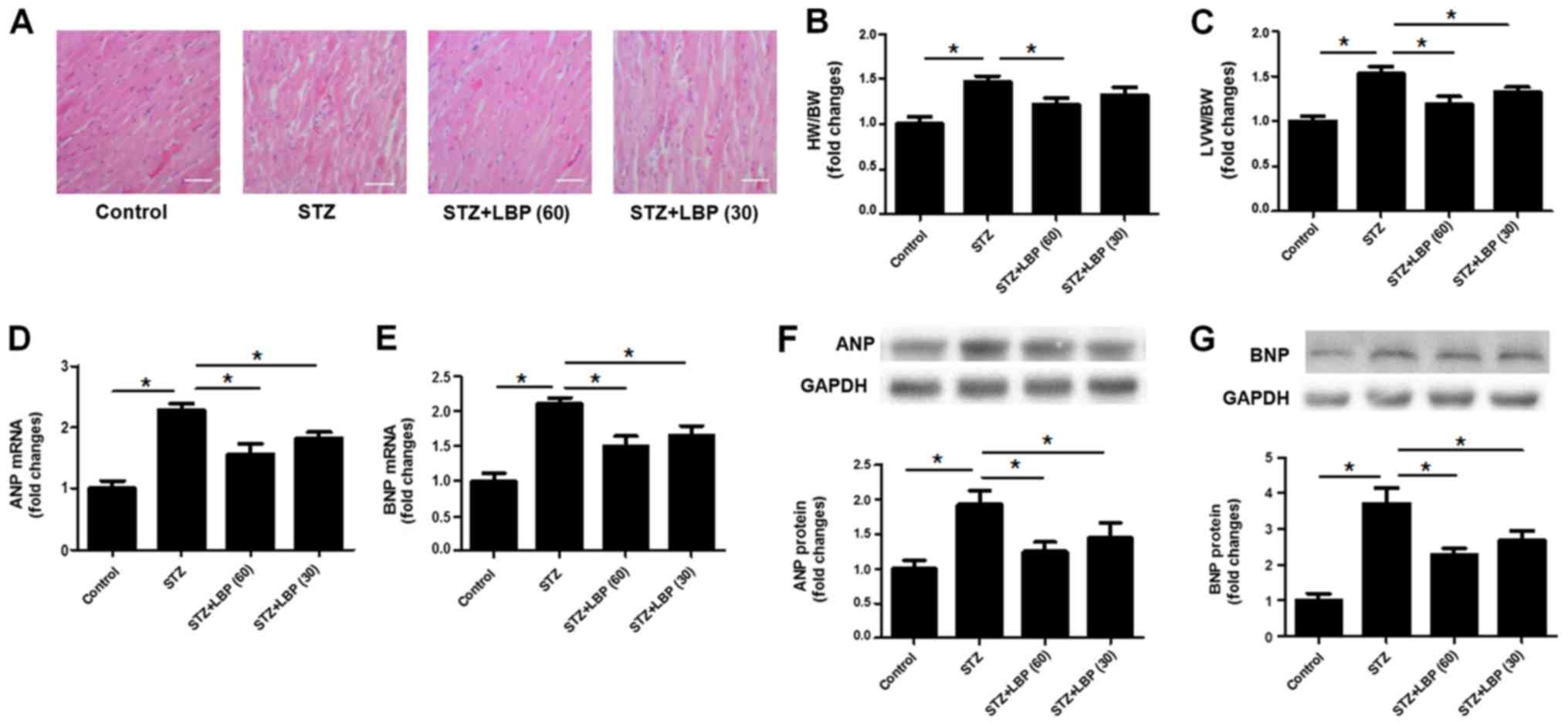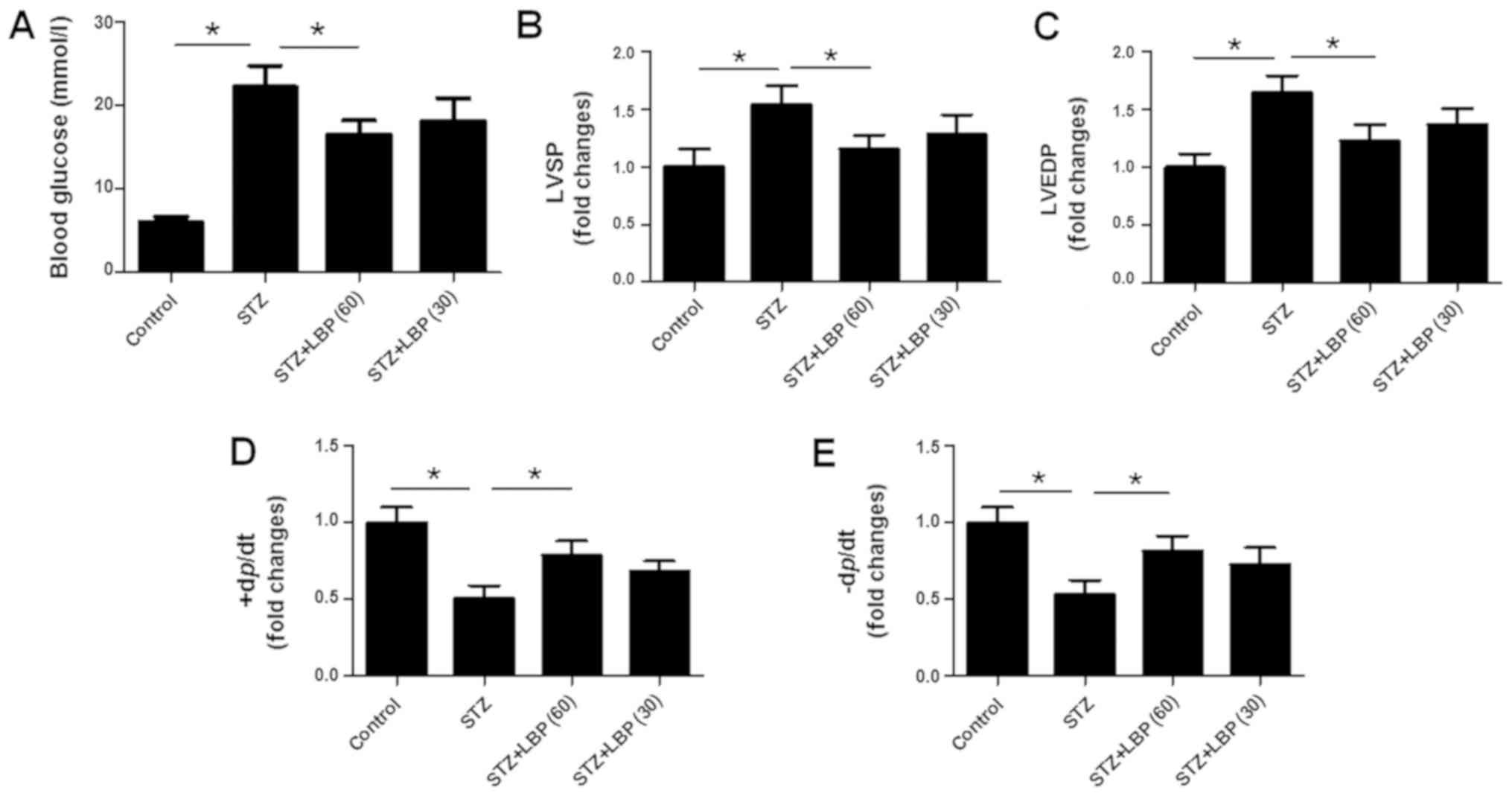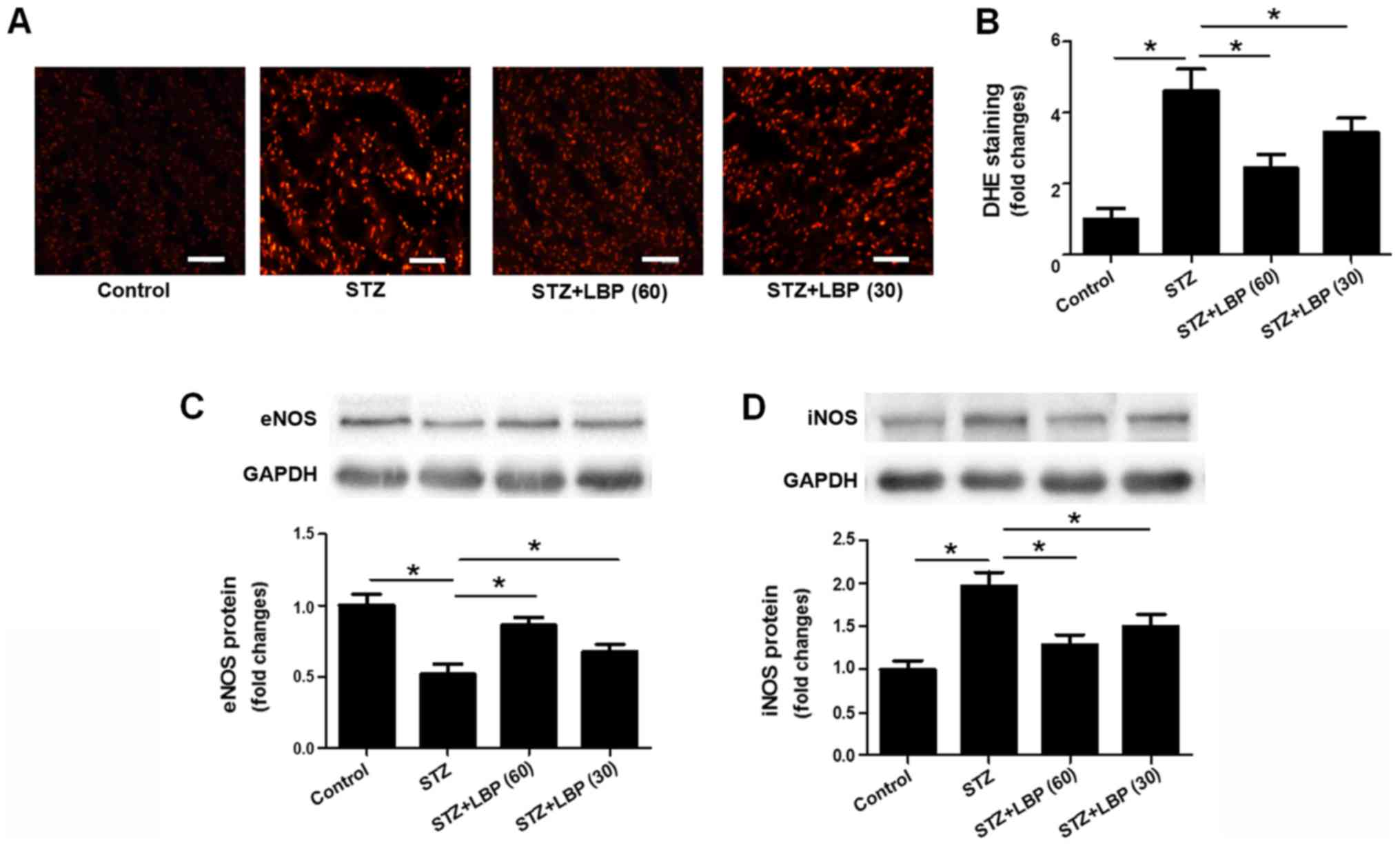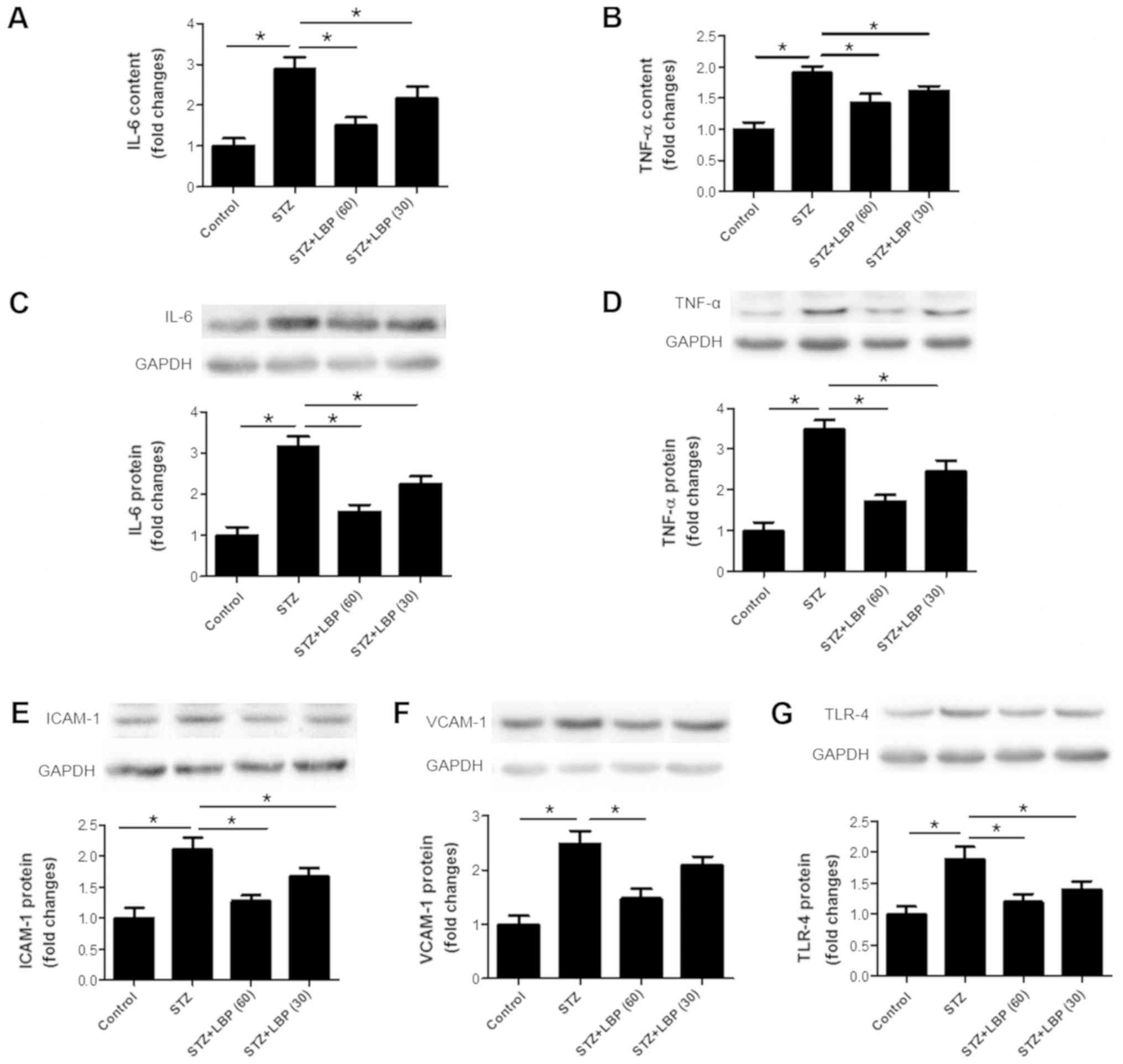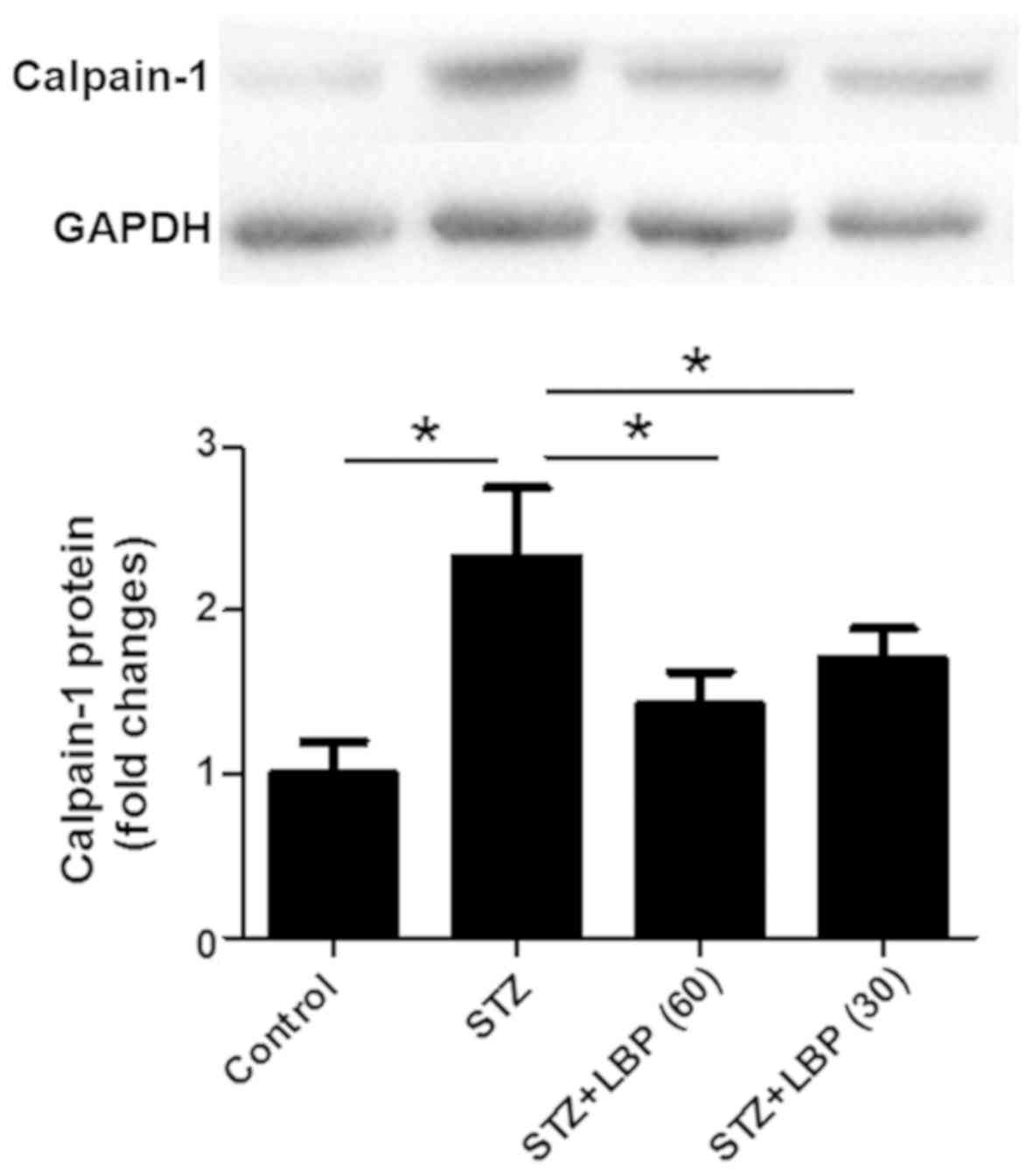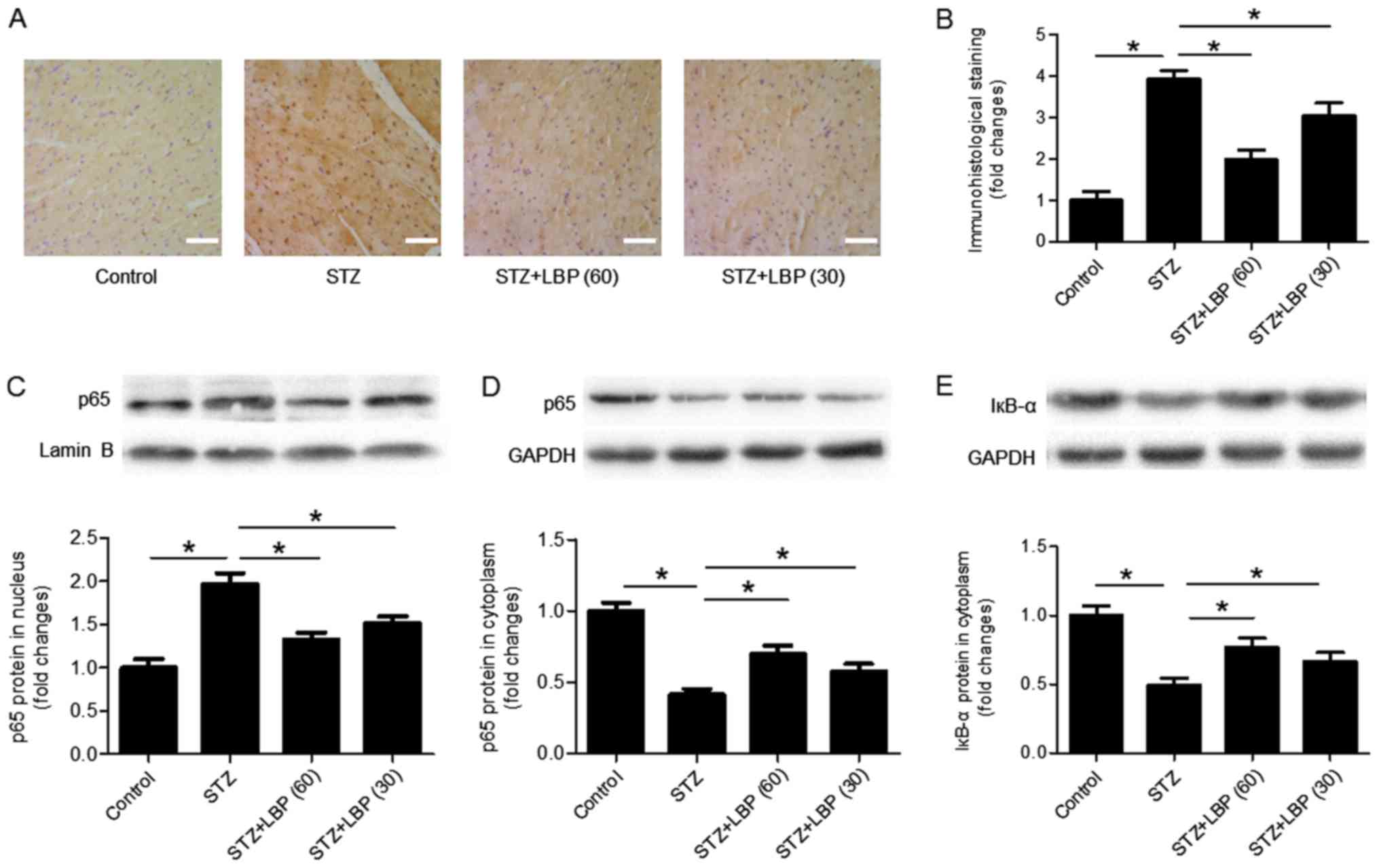|
1
|
Zhang J, Qiu H, Huang J, Ding S, Huang B,
Wu Q and Jiang Q: Naringenin exhibits the protective effect on
cardiac hypertrophy via EETs-PPARs activation in
streptozocin-induced diabetic mice. Biochem Biophys Res Commun.
502:55–61. 2018. View Article : Google Scholar : PubMed/NCBI
|
|
2
|
Li Y, Ma J, Zhu H, Singh M, Hill D, Greer
PA, Arnold JM, Abel ED and Peng T: Targeted inhibition of calpain
reduces myocardial hypertrophy and fibrosis in mouse models of type
1 diabetes. Diabetes. 60:2985–2994. 2011. View Article : Google Scholar : PubMed/NCBI
|
|
3
|
Negishi K: Echocardiographic feature of
diabetic cardiomyopathy: Where are we now? Cardiovasc Diagn Ther.
8:47–56. 2018. View Article : Google Scholar : PubMed/NCBI
|
|
4
|
Yan M, Chen K, He L, Li S, Huang D and Li
J: Uric acid induces cardiomyocyte apoptosis via activation of
calpain-1 and endoplasmic reticulum stress. Cell Physiol Biochem.
45:2122–2135. 2018. View Article : Google Scholar : PubMed/NCBI
|
|
5
|
Hua Y and Nair S: Proteases in
cardiometabolic diseases: Pathophysiology, molecular mechanisms and
clinical applications. Biochim Biophys Acta. 1852:195–208. 2015.
View Article : Google Scholar : PubMed/NCBI
|
|
6
|
Chen B, Zhao Q, Ni R, Tang F, Shan L,
Cepinskas I, Cepinskas G, Wang W, Schiller PW and Peng T:
Inhibition of calpain reduces oxidative stress and attenuates
endothelial dysfunction in diabetes. Cardiovasc Diabetol.
13:882014. View Article : Google Scholar : PubMed/NCBI
|
|
7
|
Yu L, Yin M, Yang X, Lu M, Tang F and Wang
H: Calpain inhibitor I attenuates atherosclerosis and inflammation
in atherosclerotic rats through eNOS/NO/NF-κB pathway. Can J
Physiol Pharmacol. 96:60–67. 2018. View Article : Google Scholar : PubMed/NCBI
|
|
8
|
Mei M, Tang F, Lu M, He X, Wang H, Hou X,
Hu J, Xu C and Han R: Astragaloside IV attenuates apoptosis of
hypertrophic cardiomyocyte through inhibiting oxidative stress and
calpain-1 activation. Environ Toxicol Pharmacol. 40:764–773. 2015.
View Article : Google Scholar : PubMed/NCBI
|
|
9
|
Xu T, Zhang B, Yang F, Cai C, Wang G, Han
Q and Zou L: HSF1 and NF-κB p65 participate in the process of
exercise preconditioning attenuating pressure overload-induced
pathological cardiac hypertrophy. Biochem Biophys Res Commun.
460:622–627. 2015. View Article : Google Scholar : PubMed/NCBI
|
|
10
|
Xu C, Tang F, Lu M, Yang J, Han R, Mei M,
Hu J, Zhou M and Wang H: Astragaloside IV improves the
isoproterenol-induced vascular dysfunction via attenuating eNOS
uncoupling-mediated oxidative stress and inhibiting ROS-NF-κB
pathways. Int Immunopharmacol. 33:119–127. 2016. View Article : Google Scholar : PubMed/NCBI
|
|
11
|
Zuo G, Ren X, Qian X, Ye P, Luo J, Gao X,
Zhang J and Chen S: Inhibition of JNK and p38 MAPK-mediated
inflammation and apoptosis by ivabradine improves cardiac function
in streptozotocin-induced diabetic cardiomyopathy. J Cell Physiol.
234:1925–1936. 2019. View Article : Google Scholar : PubMed/NCBI
|
|
12
|
Wang Y, Huang X, Ma Z, Wang Y, Chen X and
Gao Y: Ophiopogonin D alleviates cardiac hypertrophy in rat by
upregulating CYP2J3 in vitro and suppressing inflammation in vivo.
Biochem Biophys Res Commun. 503:1011–1019. 2018. View Article : Google Scholar : PubMed/NCBI
|
|
13
|
Yun JM, Jialal I and Devaraj S: Epigenetic
regulation of high glucose-induced proinflammatory cytokine
production in monocytes by curcumin. J Nutr Biochem. 22:450–458.
2011. View Article : Google Scholar : PubMed/NCBI
|
|
14
|
Zou J, Li H, Chen X, Zeng S, Ye J, Zhou C,
Liu M, Zhang L, Yu N, Gan X, et al: C/EBPβ knockdown protects
cardiomyocytes from hypertrophy via inhibition of p65-NFκssssB. Mol
Cell Endocrinol. 390:18–25. 2014. View Article : Google Scholar : PubMed/NCBI
|
|
15
|
Tang HL, Chen C, Wang SK and Sun GJ:
Biochemical analysis and hypoglycemic activity of a polysaccharide
isolated from the fruit of Lycium barbarum L. Int J Biol Macromol.
77:235–242. 2015. View Article : Google Scholar : PubMed/NCBI
|
|
16
|
Yang DM, Zhang JQ and Fei YF: Lycium
barbarum polysaccharide attenuates chemotherapy-induced ovarian
injury by reducing oxidative stress. J Obstet Gynaecol Res.
43:1621–1628. 2017. View Article : Google Scholar : PubMed/NCBI
|
|
17
|
Chen S, Liang L, Wang Y, Diao J, Zhao C,
Chen G, He Y, Luo C, Wu X and Zhang Y: Synergistic
immunotherapeutic effects of Lycium barbarum polysaccharide and
interferon-α2b on the murine Renca renal cell carcinoma cell line
in vitro and in vivo. Mol Med Rep. 12:6727–6737.
2015. View Article : Google Scholar : PubMed/NCBI
|
|
18
|
Du M, Hu X, Kou L, Zhang B and Zhang C:
Lycium barbarum polysaccharide mediated the antidiabetic and
antinephritic effects in diet-streptozotocin-induced diabetic
sprague dawley rats via regulation of NF-κB. Biomed Res Int.
2016:31402902016. View Article : Google Scholar : PubMed/NCBI
|
|
19
|
Shi GJ, Zheng J, Han XX, Jiang YP, Li ZM,
Wu J, Chang Q, Niu Y, Sun T, Li YX, et al: Lycium barbarum
polysaccharide attenuates diabetic testicular dysfunction via
inhibition of the PI3K/Akt pathway-mediated abnormal autophagy in
male mice. Cell Tissue Res. 374:653–666. 2018. View Article : Google Scholar : PubMed/NCBI
|
|
20
|
Liu SY, Chen L, Li XC, Hu QK and He LJ:
Lycium barbarum polysaccharide protects diabetic peripheral
neuropathy by enhancing autophagy via mTOR/p70S6K inhibition in
Streptozotocin-induced diabetic rats. J Chem Neuroanat. 89:37–42.
2018. View Article : Google Scholar : PubMed/NCBI
|
|
21
|
Shi GJ, Zheng J, Wu J, Qiao HQ, Chang Q,
Niu Y, Sun T, Li YX and Yu JQ: Protective effects of Lycium
barbarum polysaccharide on male sexual dysfunction and fertility
impairments by activating hypothalamic pituitary gonadal axis in
streptozotocin-induced type-1 diabetic male mice. Endocr J.
64:907–922. 2017. View Article : Google Scholar : PubMed/NCBI
|
|
22
|
Shi GJ, Zheng J, Wu J, Qiao HQ, Chang Q,
Niu Y, Sun T, Li YX and Yu JQ: Beneficial effects of Lycium
barbarum polysaccharide on spermatogenesis by improving antioxidant
activity and inhibiting apoptosis in streptozotocin-induced
diabetic male mice. Food Funct. 8:1215–1226. 2017. View Article : Google Scholar : PubMed/NCBI
|
|
23
|
Zhao R, Li QW, Li J and Zhang T:
Protective effect of Lycium barbarum polysaccharide 4 on kidneys in
streptozotocin-induced diabetic rats. Can J Physiol Pharmacol.
87:711–719. 2009. View
Article : Google Scholar : PubMed/NCBI
|
|
24
|
National Research Council (US) Committee
for the Update of the Guide for the Care and Use of Laboratory
Animals, . Guide for the Care and Use of Laboratory Animals, 8th
edition. National Academies Press (US); Washington, DC: 2011
|
|
25
|
Tang F, Lu M, Yu L, Wang Q, Mei M, Xu C,
Han R, Hu J, Wang H and Zhang Y: Inhibition of TNF-α-mediated NF-κB
Activation by Ginsenoside Rg1 Contributes the Attenuation of
Cardiac Hypertrophy Induced by Abdominal Aorta Coarctation. J
Cardiovasc Pharmacol. 68:257–264. 2016. View Article : Google Scholar : PubMed/NCBI
|
|
26
|
Livak KJ and Schmittgen TD: Analysis of
relative gene expression data using real-time quantitative PCR and
the 2(-Delta Delta C(T)) method. Methods. 25:402–408. 2001.
View Article : Google Scholar : PubMed/NCBI
|
|
27
|
Alvarez BV, Quon AL, Mullen J and Casey
JR: Quantification of carbonic anhydrase gene expression in
ventricle of hypertrophic and failing human heart. BMC Cardiovasc
Disord. 13:22013. View Article : Google Scholar : PubMed/NCBI
|
|
28
|
Cai H, Liu F, Zuo P, Huang G, Song Z, Wang
T, Lu H, Guo F, Han C and Sun G: Practical application of
antidiabetic efficacy of Lycium barbarum polysaccharide in patients
with type 2 diabetes. Med Chem. 11:383–390. 2015. View Article : Google Scholar : PubMed/NCBI
|
|
29
|
Guo Y, Zhuang X, Huang Z, Zou J, Yang D,
Hu X, Du Z, Wang L and Liao X: Klotho protects the heart from
hyperglycemia-induced injury by inactivating ROS and NF-κB-mediated
inflammation both in vitro and in vivo. Biochim Biophys Acta Mol
Basis Dis. 1864:238–251. 2018. View Article : Google Scholar : PubMed/NCBI
|
|
30
|
Ni R, Zheng D, Xiong S, Hill DJ, Sun T,
Gardiner RB, Fan GC, Lu Y, Abel ED, Greer PA and Peng T:
mitochondrial calpain-1 disrupts atp synthase and induces
superoxide generation in type 1 diabetic hearts: A novel mechanism
contributing to diabetic cardiomyopathy. Diabetes. 65:255–268.
2016.PubMed/NCBI
|















